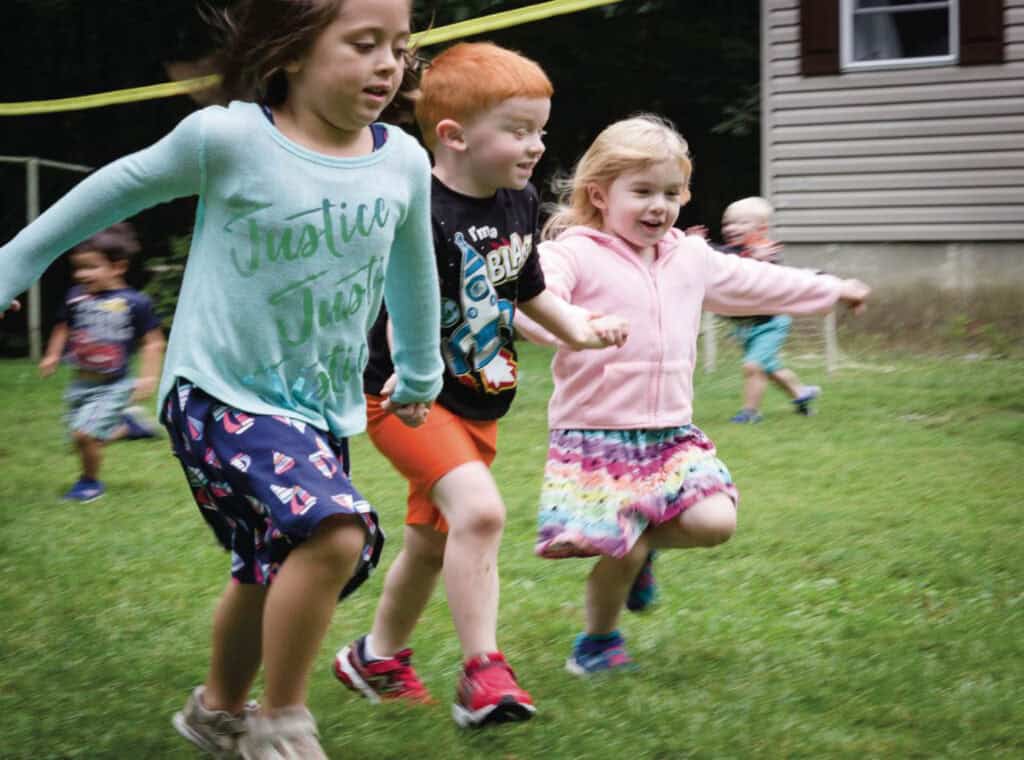The Early Head Start-Child Care Partnerships (EHS-CCP) are federally-funded, locally-run programs that bring together the best of Early Head Start and child care through a layering of funding to provide comprehensive and continuous early child development and family engagement services to infants, toddlers and their families.
The EHS-CCP model helps support child care partners with funding and holistic support. Currently, 13 Educare organizations in 12 states and the District of Columbia administer Partnership grants with local child care centers and family child care homes, school districts, special education programs, homeless shelters and other community organizations.
Where We Are: Partnerships & Progress
In mid-2020, a survey from the National Association for the Education of Young Children (NAEYC) reflected that 73 percent of responding child care programs couldn’t survive a one-month closure without financial support. As the COVID-19 pandemic continued, exacerbating the challenges facing the early care and learning system, this proved to be an unfortunate truth for many child care programs nationwide.
However, results were dramatically different for most child care programs who were part of Early Head Start-Child Care Partnerships (EHS-CCP). Instead of a bevy of long-term program closures, Partnerships saw large-scale retention of programs and witnessed business models survive treacherous times, thanks to the existing relationships between Early Head Start and child care providers.
Even now, in the face of much uncertainty, partners continue to express how beneficial the ongoing engagement and support is to their programs. Partnership sites cite administrative scaffolds like family food access, grant management and staffing supports around hiring, and professional development as being particularly critical assets right now. Child care providers speak to the strengths of collaboration as being bigger than just finances; it’s the professional development, the community of providers, the home-to-school connections fostered through family service workers, and the knowledge that they aren’t facing these challenges alone that provide the greatest value.
When hardships inevitably occurred, child care programs in the EHS-CCP model knew about them immediately due to partners communicating their needs, which allowed agencies to quickly respond. Through the trust and rapport already built, along with existing pipelines of support, Head Start and child care partners were better prepared to access the crucial financial and social-emotional resources needed for their programs. We grounded ourselves in relationships – and as a result, our network remained strong and better able to respond to the needs of families, staff and the broader community.
Across the country, we continue to witness the impact of a lack of access to quality child care. The evidence is all around us, in our families, communities and places of employment. Many of us know parents who have felt forced into finding alternative means of child care or leaving the workforce entirely.
While the pandemic disrupted systems nationwide, with support from the Office of Head Start, Partnerships allowed critical services to continue for thousands of families across the country. With its ongoing and intentional focus on collaboration between Early Head Start and child care providers, the EHS-CCP model will continue to help families and communities thrive. The data and examples shared by EHS-CCP providers indicate the success of this model and the potential for partnerships to serve as a strategy to strengthen the broader early care and learning system.
Looking Ahead: Opportunities for Action
Currently, child care programs across the nation are still facing many obstacles and struggling to provide services, despite the fact that their essential services make it possible for parents and guardians to provide for their families and contribute to their communities. This post is the first in a series of articles designed to illuminate both the strengths and challenges of child care, the benefits of partnership with Head Start, and cross-cutting issues important to the broader early childhood field.
Do you want to add to the conversation? Use your voice today by advocating for investments in early care and education in ongoing federal budget negotiations!
For more information about the EHS-CCP model at Educare, check out our 8-part series, A Path to High-Quality Child Care through Partnerships.
Are there further questions around child care or Early Head Start you’d like to explore, or feedback you would like to share? Let us know by emailing support@educarenetwork.org.
About the Author
Andrew Bourassa is a HomeStart Supervisor and Coach for Kennebec Valley Community Action Program and a member of the Educare Learning Network EHS-CCP Community of Practice (CoP). The vision of this CoP is to build a community of Network leaders who gain support from one another, share ideas, collaborate on professional development initiatives, and inform the early childhood field through advocacy and policy change. We want to continue fostering relationships throughout the Network and build on existing connections and structures to assure ongoing communication is effectively supported.
Header image courtesy of Maine Community Foundation
